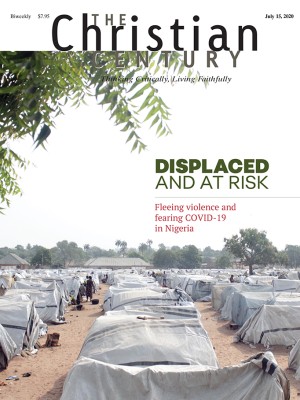“And Jacob was left alone.” Our most painful times in life are when we sense that we are all alone. A child feels unsupported when no one shows up to the school’s spring concert. Dinner does not taste the same without the conversation and laughter of loved ones. Even a thrilling roller coaster seems more terrifying with no one to hold onto and scream with.
This particular isolation we’ve been going through is unique. The devastation of our period of sequestered isolation will probably produce long-term effects on our mental health and our sense of social safety. Since COVID-19 set upon us, we have encountered many dimensions of isolation. Most cruelly, people who are sick are dropped off at the hospital door to enter into diagnosis and therapy alone. If they succumb to the disease’s brutal grips, family members and friends are left to grieve in solitude, cut off from the communities that help them to heal.
Read our latest issue or browse back issues.
Jacob has arranged this solitude himself. He is on a journey to reunite with Esau for the first time since he stole his brother’s birthright. Much time has passed. Jacob has continued his manipulative ways and accumulated both wealth and family. Jacob sends them ahead, perhaps in a last-ditch precaution to preserve himself.
When we’re alone, it can be frightening to ask ourselves piercing questions. At the ford of Jabbok, Jacob no doubt spends time asking questions like, Where am I? How did I get here? Who am I? And where am I going from this place? Given the unending drama that seems to follow him around, Jacob is not spared such introspection.
Looking in on Jacob, we speculate. The possibilities are almost endless. Maybe the anxiety of reuniting with Esau has overtaken him. Could this be a panic attack? Is this wrestling all in his mind? Perhaps his wealth betrays him, and robbers come upon him to pillage whatever things he has. Maybe Esau has shown up anonymously, under the cloak of night, to exact his revenge on his little brother.
Isolation is never pure. We are always with our thoughts, our prior actions, and our future uncertainties. It is often in this place that we battle our demons.
Well, this particular time, not a demon per se. Jacob wrestles with a being of some kind. And devoted Bible readers are likely to defer to their preferred edition, which may frame this text as, “Jacob wrestles with an angel.”
But what if God is not an angel?
The text itself seems to concur with this: Jacob wrestles with “a man.” This only causes those whose doctrine depends on an omnipotent God to be perplexed. Surely it must be an angel.
As a seminarian, I was blessed to take my introductory Hebrew Bible course with the incomparable Phyllis Trible. In her lecture on this text, Trible made the case that the best translation of the verb “to wrestle” is to “make God dirty.” Our notions of God make us want to save God from vulnerabilities. How soon we forget. Did not God show us, at the beginning of this book of beginnings, that God was willing to become dirty to create us? But we are uncomfortable with a God who appears to be losing this through-the-night battle.
Irrespective of status or station, we come to a moment of self-inventory and introspection. In some instances, this is a moment of meditation on behalf of others; being alone is frightening. Perhaps to wrestle with any of these things—our anxieties, the breakdown of our families, the problem of community—is at its heart to wrestle with God.
We should take Jacob’s answer to this struggle seriously. “I have seen God face to face,” he declares, “and yet my life is spared.”
How does God untangle, and why? Jacob’s insistence that he will not let this being go until he is blessed is not a statement of determined faith. Remember who Jacob is—through his life, he has leveraged his power within relationships. But the being asks the question that will shake Jacob up and break him from this cycle of power over and against others: “What is your name?”
We never get away from this question of our own identity. It is not about who we are wrestling with as much as who we are. Remember, when Jacob was asked his name at the blessing of the birthright, he lied. The confession comes, and now he is ready to receive what only his honesty and this being can produce.
There is no reciprocity here. The being does not answer Jacob’s request for his name. The being is still not fully known. In moments like ours, we do not need a God who sits on a throne and controls everything as much as we need a God willing to become intimately intertwined in our struggles for our change and the change of creation.
Whatever we struggle with in our times of isolation, we are ultimately struggling with what we believe about God. The place where we are both isolated and committed to our struggle is the place where we meet God. This encounter is an inward wrestling with who we are and where we are going. And when we come to this place, maybe it is time to let go—not because God is weak, but because in wrestling with the mystery, we can see ourselves differently in the light of the new day.
And so we leave this isolation, limping.





